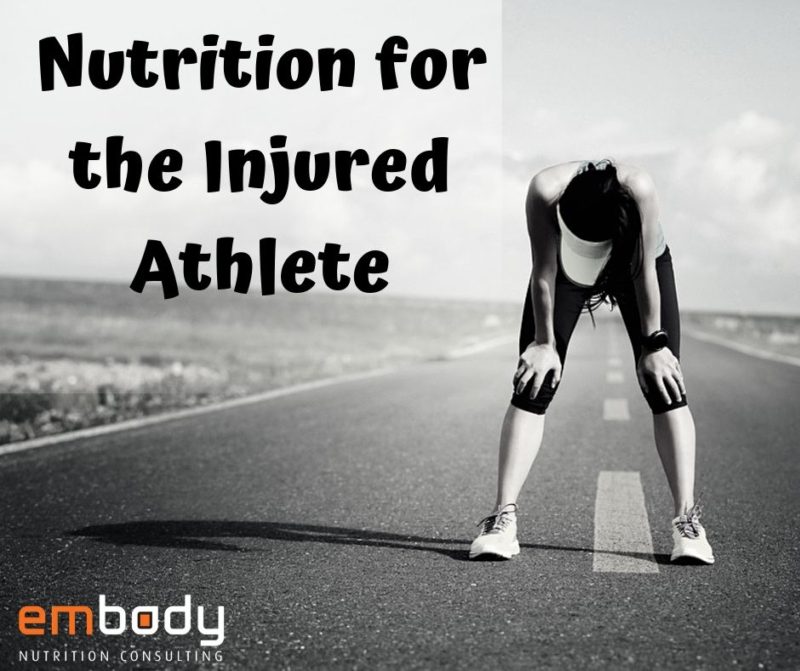There are a few nutrition considerations to think about if you’re recovering from an exercise-induced injury. These kind of injuries can range from being out of play for a few days, to weeks, months or even years of recovery time. What we’re going to focus on in today’s article is on the slightly more severe spectrum, being an injury that might involve several weeks out of the game and reduced activity, as well as potential immobilisation of the injured limb.
Being mindful of nutrition after an injury is going to reducing the length of time and reduce the negative aspects of reduced activity and immobilisation, as well as support your return to activity and training.
Recovery from an injury may be considered to have 2 main stages, both of which might be influenced by your nutrition choices:
- The first is the healing and recovery stage, characterised by inflammation and usually reduced activity.
- The second is the return to activity and rehabilitation.
Putting a stop to the inflammation – or should you?
The inflammatory response is a normal and essential part of healing an injury.
Despite this, nutritional recommendations to reduce inflammation are widespread. Recommendations for high intake of anti-inflammatory and antioxidant nutrients (including omega-3, vitamins and phytonutrients) are often pushed, but this may dampen the recovery response. Thus, this should be done with great caution, and perhaps only in the cause of excessive or prolonged inflammation.
So, what SHOULD you do?
Two things the science says we definitely want to mindful of when injured, are energy and protein intake.
Energy: When your training load is reduced or even ceased entirely, the immediate reaction might be to reduce energy intake – but energy needs but not be as low as you think. Energy needs can go up from 15-50% due to injury, and if using crutches’, the energy exerted getting around could be considerable. Inadequate energy can impair wound healing and exacerbate muscle loss – so it’s something to be avoided. On the other end of the spectrum, excessive energy is also undesirable, with evidence showing it may accelerate muscle loss during inactivity likely via activation of systemic inflammation.
Protein: Immobilisation of a limb due to injury results in a dramatic loss of muscle mass, strength and function. Thus is due to a decrease in muscle protein synthesis (MPS) and ‘anabolic resistance’ – whereby the muscle is less responsive to what would normally promote muscle protein synthesis (e.g. protein in food). You may need more protein to maximally stimulate MPS. Studies show needs may be ~2-2.5g/kg/day or 35% of your daily intake. Additionally, spreading protein over the day is key to maximising MPS. A decrease in protein following a relatively severe injury may result in impaired wound healing and increased muscle loss. Thus, at least maintenance or an increase in protein ingested during reduced activity is important. If decreasing total energy intake, it is important to be mindful of how much protein you’re getting.
What else is out there?
There is some early research that omega-3 fatty acids, leucine and creatine can counter muscle loss during reduced activity following an injury. However, the evidence does not show a clear or consistent effect, and dose and timing are relatively unknown, thus prescribing these should be done with caution.
There is some interesting emerging evidence for collagen supplements prior to exercise and their role in increasing collagen production to strengthen tendons/ligaments and decrease pain. Evidence points toward 15-20g of hydrolysed collagen or gelatin ½ – 1 hour before training. Training will ensure collagen is targeted to the parts of the body that are most loaded during the session.
What should you definitely avoid?
Deficiencies in energy, protein and other nutrients should be avoided whilst recovering from an injury. There is a clear association of many micronutrients, including zinc, Vitamin C and Vitamin A with various aspects of wound healing, recovery and muscle disuse. Note that while they are important, unless you are deficient there is no evidence to suggest supplementing these. Hopefully it’s obvious – but excessive alcohol ingestion should be avoided, as it may impair muscle protein synthesis and wound healing.
References:
- Tipton, K. D (2017), Nutritional support for injuries requiring reduced activity, Sports Science Exchange, vol. 28, no. 169.
- http://www.mysportscience.com/single-post/2017/03/15/Using-gelatin-to-improve-performance-prevent-injury-and-accelerate-return-to-play

